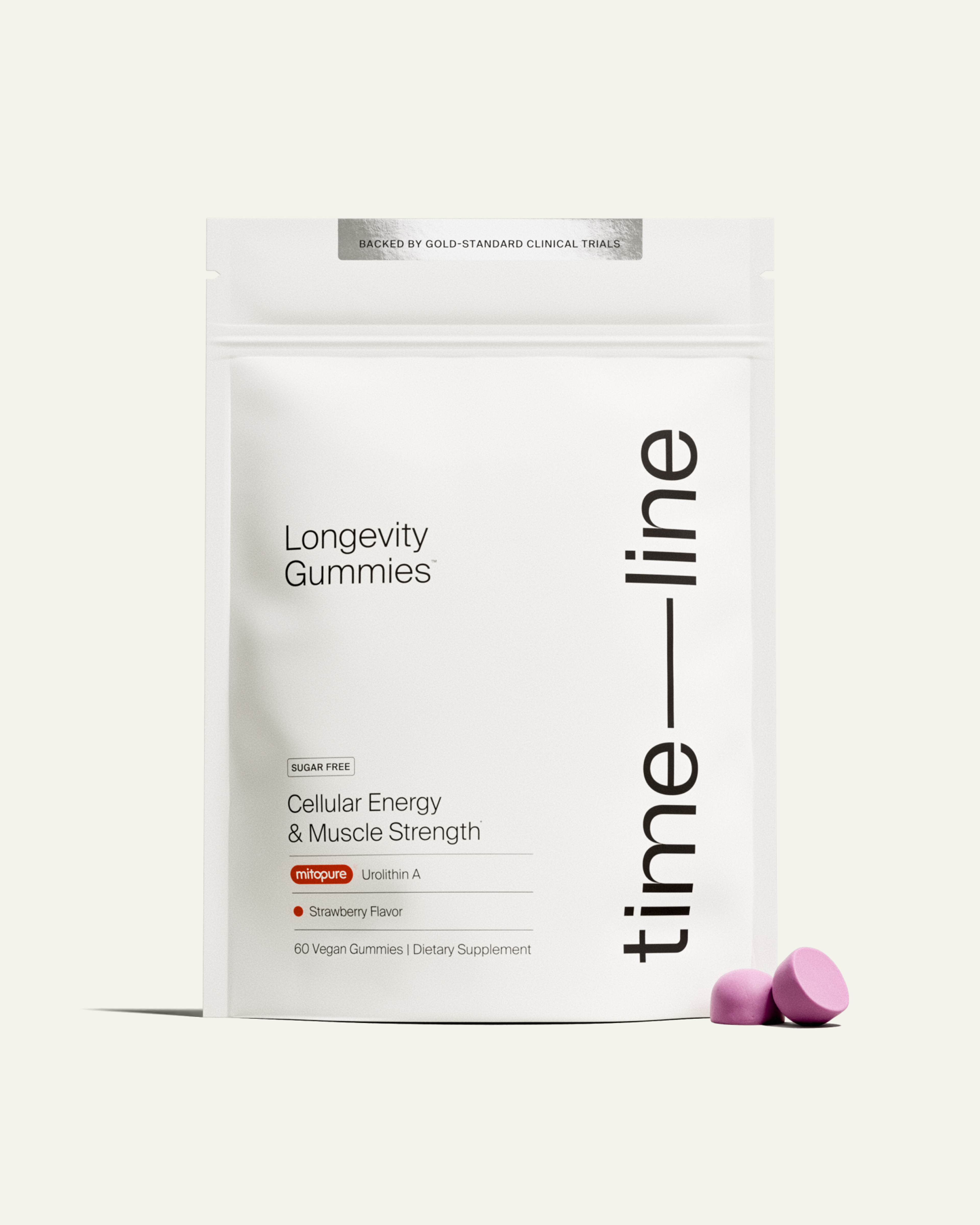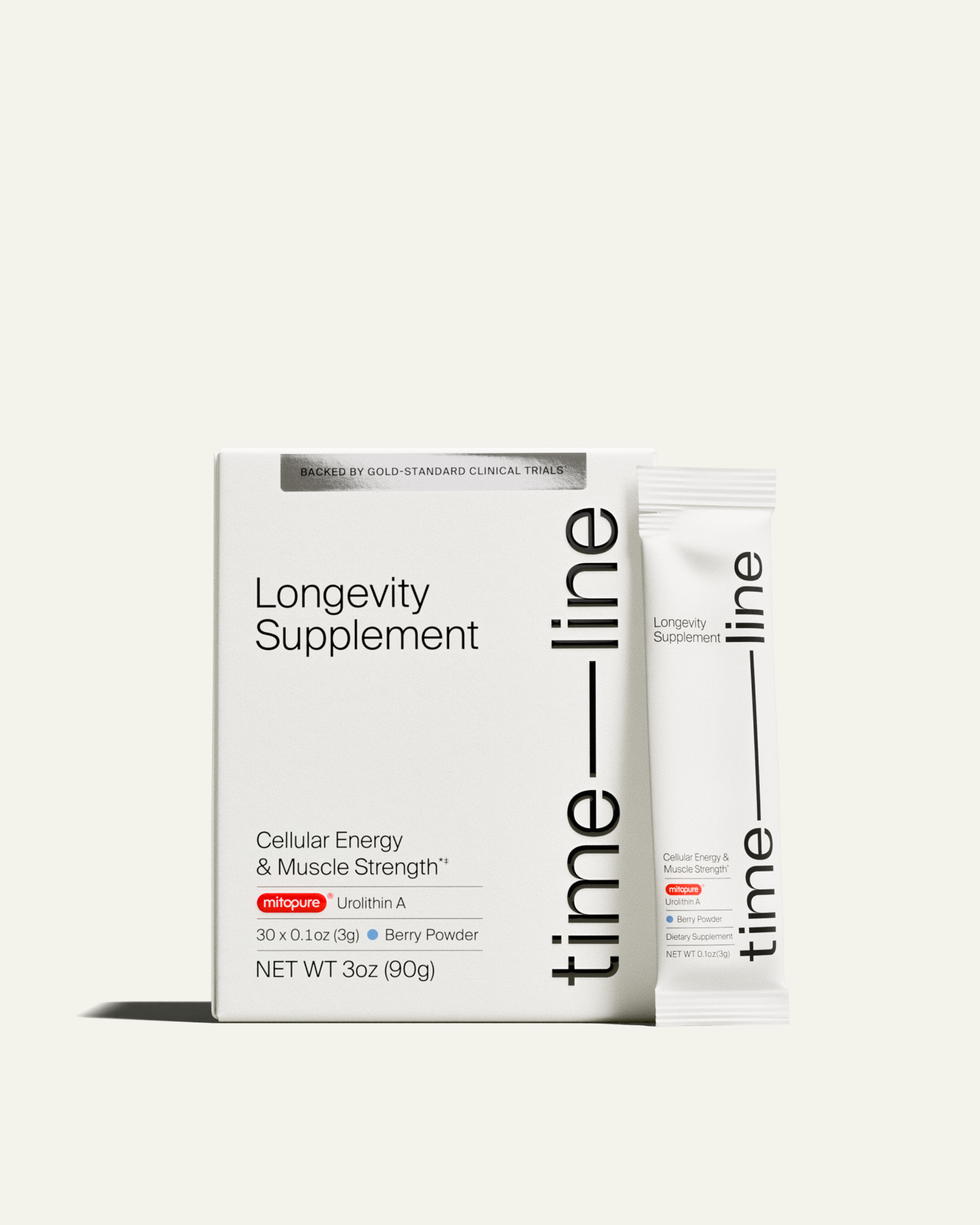Sleep’s Role in Brain Function for Brain Health
Getting good sleep for brain health is vital. Learn sleep’s effect on brain health and how to improve your sleep for better focus, memory, and more.
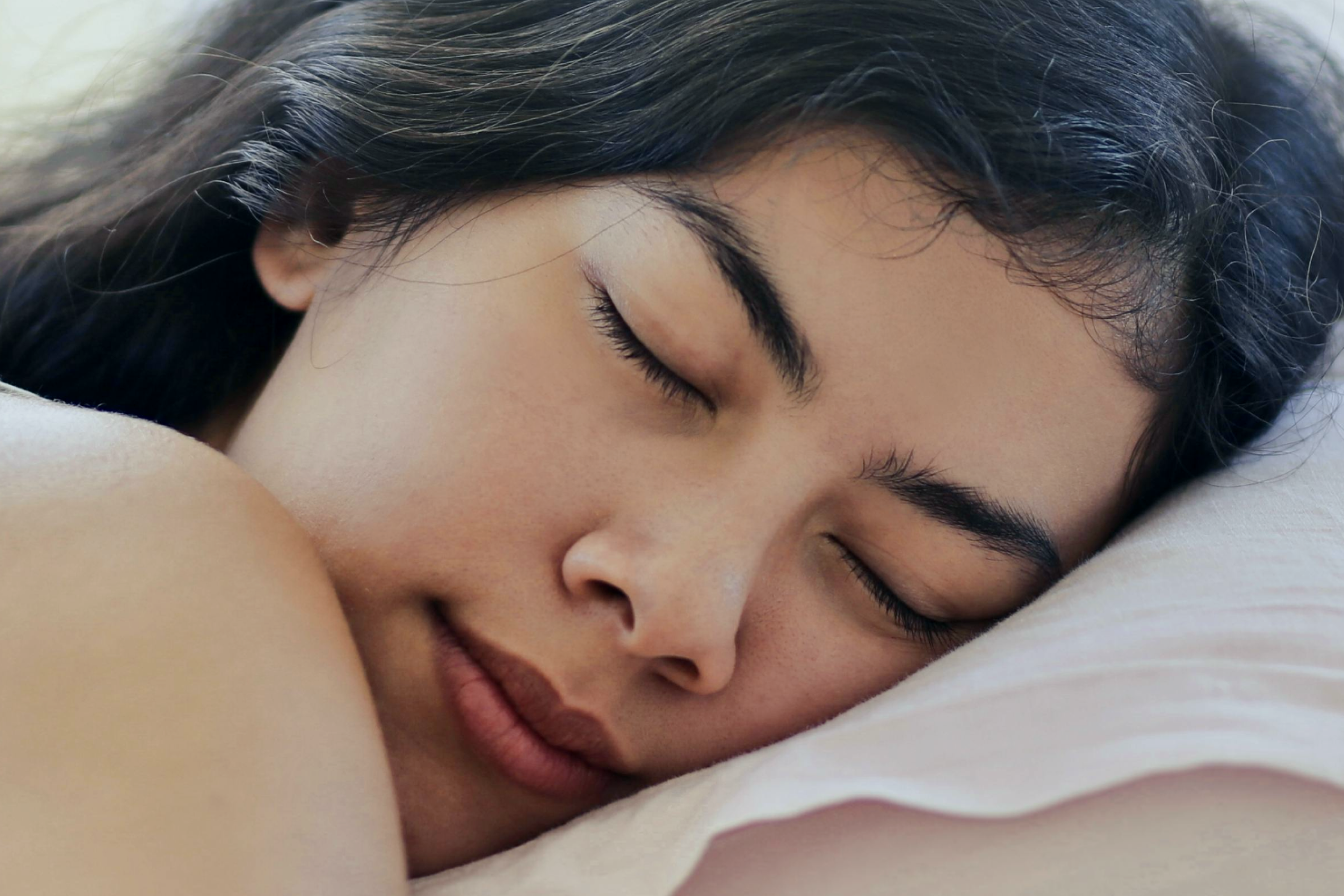
What to know
Sleep is essential for brain health, aiding memory consolidation, toxin clearance, and mood regulation.
The glymphatic system is the brain’s system of removing harmful waste and supporting its optimal function is most active during sleep.
REM (rapid eye movement) and non-REM sleep stages are crucial for brain activities such as emotional processing, memory consolidation, and physical recovery.
Tweaking sleep routines, diet, exercise timing, mindfulness, and more can enhance brain health and cognitive performance.
Sleep is more than a time to recharge—it’s essential for brain health and cognitive function. While you sleep, your brain undergoes cellular cleanup processes that help it to function more effectively. This article dives into sleep’s role in brain function for brain health and includes practical tips on improving your sleep no matter what you have going on in your life.
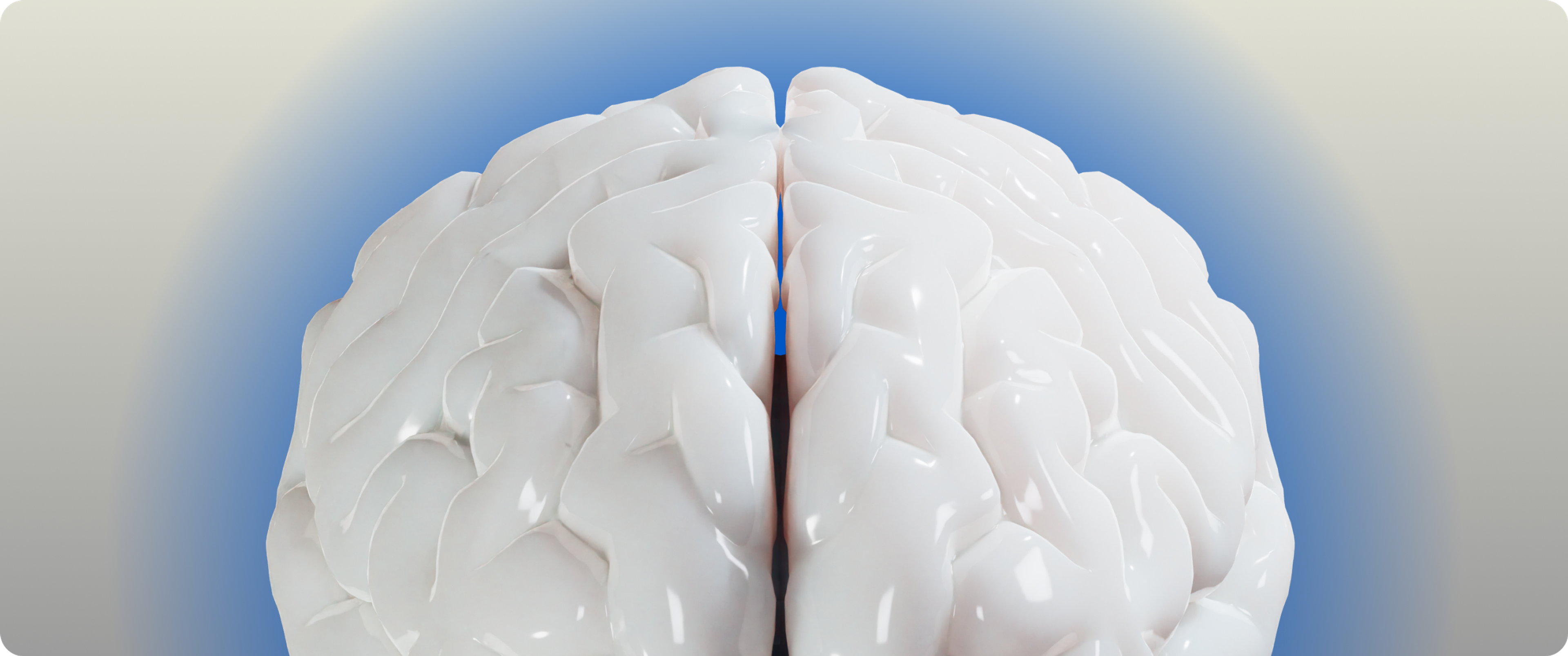
How Sleep Powers Brain Health
Sleep’s effect on brain health cannot be understated. While your mind and body rest, your brain is working hard at the cellular level performing critical maintenance tasks for brain health. This nightly “brain cleanse” preps your mind for prime functioning, creativity, and resilience the next day.
Our brain has a special system for keeping things in equilibrium and filtering out things we don’t need. This system is known as the glymphatic system, and it is responsible for clearing out waste and toxins. During sleep, this system is the most active, removing toxins at an accelerated rate to enhance mental clarity and preserve long-term brain health.[1]
Some of the brain activities being performed during sleep include:
- Consolidation of memories: When you sleep, your brain works to put together the moments of your day and consolidate them into memories. This helps you retain valuable information, such as a key takeaway from a work meeting or an exciting moment during your son’s baseball game.
- Clearance of toxins: It’s not just your liver that removes toxins - your brain does it too! During sleep, nerve cells fire electrical signals that work to flush fluid through brain tissue, washing out waste and toxic proteins that can form plaque and harm the brain over time.[2]
- Regulation of blood sugar: Stable glucose (i.e., blood sugar) levels are essential for the brain, as glucose is its primary energy source. During restful sleep, the body can process glucose more efficiently, helping to keep blood sugar levels stable.[3]
- Strengthening of nerve connections: During sleep, the brain strengthens its nerve connections, which "locks in" important memories and skills.
- Balancing of mood chemicals: While you sleep, your brain helps regulate levels of serotonin and dopamine, critical chemicals that create feelings of happiness and enjoyment.[4]
- Regulation of stress hormones: Sleep helps regulate cortisol levels in the brain, a hormone closely tied to how you respond to stress.
These activities are just a handful of examples that help the brain put the pieces of our day together and recall memorable moments. The brain’s specific activity patterns change throughout the different stages of the sleep cycle, such as REM (rapid eye movement) and non-REM sleep.
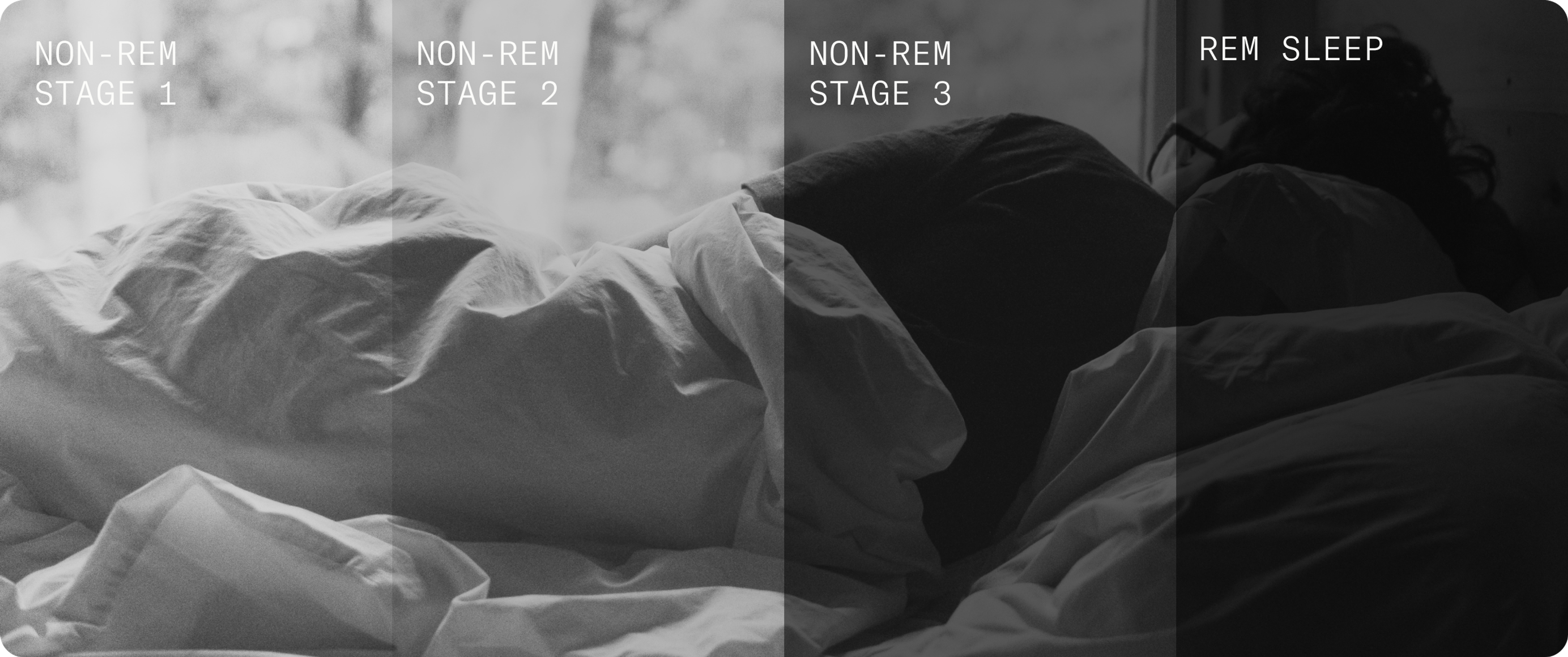
Stages of Sleep
While there are technically five stages of sleep, they can be broken up into REM versus non-REM (NREM) sleep for brain health. A typical full night’s sleep (at least 7 hours) consists of 4 to 5 sleep cycles, each lasting roughly 90 to 110 minutes. Going through the entire sleep cycle process is essential to experience all the restorative benefits of sleep[5].
REM Sleep
REM sleep, or rapid eye movement sleep, is the last part of the sleep cycle where the brain becomes more active. While it may seem like this stage is not quite as restful, it’s crucial for essential brain tasks such as processing emotions, consolidating memories, and creative problem-solving. It’s during this stage where your brain can process the events of that day and put all the pieces together.
Good sleep for brain health requires enough REM sleep, which is the prime time the brain rests and restores itself to regenerate nerve cells. It is the stage of sleep seen to be the most connected to emotional memory and creative thinking. These two critical brain activities are necessary to be present in the moment and live a more fulfilling life.[6]
Non-REM (NREM) Sleep
Non-REM sleep consists of three stages, starting with light sleep and then transitioning to more deep sleep in the third stage.
While it may seem as if things are quieting down as we progress to deep sleep, the glymphatic system is still working to clear out waste and harmful proteins that have built up throughout the day. This sets the stage for the deeper cognitive and memory processing that takes place during later REM sleep. As important as REM sleep, NREM sleep primes the brain for cognitive clarity and mental alertness upon waking.
NREM sleep is also essential for muscle growth, immune function, and overall recovery.[7]
Side vs Back Sleeping for Brain Health
You might be wondering if your sleeping position has any impact on the health benefits of sleep.
A recent study investigated whether lying on your back versus your side was better for brain health. This study found that sleeping on your side was better, as it may improve the flow of cerebrospinal fluid (the fluid from the brain and spinal cord) to remove toxins. However, researchers note that more rigorous research needs to be done to confirm this.[8]
If you want to sleep on your side more, you can try placing a pillow on each side of you to hug for extra comfort when you sleep.

Your Circadian Rhythm and Optimal Brain Function
If you want to maximize your sleep benefits for brain health, it begins with taking the steps to sync your circadian rhythm. This 24-hour internal clock in our brain regulates sleep, energy, and overall health and tells us when to sleep. However, certain habits and environmental factors can interrupt these signals and negatively impact sleep.
The good news is you can reset your circadian rhythm with a few simple tweaks and habits. These strategies are forms of “biohacking” your sleep, a movement to use the tools of science to improve health via self-experimentation and data tracking.
Light Exposure
Exposure to bright light in the morning and dark, dim lights at night sets a healthy circadian rhythm. This signals your brain when it’s time to sleep and wake up.
Limit bright lights at night within an hour of bedtime, especially blue screens from devices like cell phones and tablets that are shown to impact sleep. At the same time, opening up your shades and getting in more natural or artificial light in the morning can make it easier for your brain to wake up.[9]
Sleep Timing
While there is not a single best time to sleep for brain health, sticking to a consistent sleep-wake schedule can support your circadian rhythm. Whenever possible, try to stick to the same sleep schedule, even on weekends, so your body develops a habit of when it’s time for bed and time to wake up.
This can also help you develop a regular sleep routine to promote single-phasic sleep, the ideal schedule for sleeping once a day at night. This is opposed to bi-phasic sleep, which is sleeping at night and a nap, which for some, can lead to more interrupted sleep, grogginess, and making it harder to fall asleep at night.[10]
Pick an ideal nighttime sleep schedule for you, such as 10:00 p.m. to 6:00 a.m., and try to stick to it. Create a relaxing routine for yourself shortly before bedtime to shut off screens and read a book or meditate instead.
Mindfulness
Being mindful involves being present and in the moment, calming the mind, and breathing to prime yourself for a healthier sleep cycle. We live in a world of constant distractions, and studies show that mindfulness practice before bed can significantly improve sleep quality.[11]
You can try mindful breathing, focusing on your breath for 10 counts, paying attention to each inhale and exhale. You can also do a body scan, moving your awareness from head to toe, relaxing each part of your body as you move down.
Diet
Eating in sync with your internal clock can support more restful sleep. While you don’t necessarily need to practice intermittent fasting, eating earlier in the day and at similar times of the day helps support your natural circadian rhythm. Being on a consistent eating schedule ensures fuel is available for your brain and that it knows when to expect it.
Adhering to a certain diet to improve brain health and sleep can make all the difference. For starters, limit certain foods such as large meals, high fat, spicy, or tomato-based acidic foods shortly before bed. These foods tend to take longer to digest, which can disrupt sleep.
In addition, limit caffeine and alcohol intake close to bedtime. While you may fall asleep easier after a glass of wine, it usually has a rebound effect that interrupts your sleep cycle and wakes you in the wee hours.[12]
Exercise
Regular exercise is shown to support circadian rhythms, improving sleep quality and duration.[13] However, the timing of your exercise matters. Avoid high-intensity exercise like heavy weight lifting, HIIT workouts, or running close to bedtime, as this can stimulate cortisol production and keep you alert and awake. Saving these vigorous activities for earlier days ensures your evenings are reserved for relaxation.
Biohacking Gadgets
There are various innovative gadgets on the market now designed to improve sleep. Wearable sleep trackers to analyze your sleep, like rings, watches, and temperature-controlled mattresses, are just a few examples of the options to support better sleep. These tools can provide valuable feedback and create an environment conducive to better sleep.
Wrapping up
Quality sleep is essential for maintaining brain health at any age. Your brain undergoes critical cellular maintenance processes while you sleep, contributing to cognitive clarity, focus, and more meaningful memories. By prioritizing good sleep habits—such as aligning with your circadian rhythm, practicing mindfulness, and considering supportive bio-hack gadgets—you can harness the full restorative power of sleep to enhance your mental and physical well-being.
Authors

Dietitian-Nutritionist, and Health Content Writer

Reviewed by
Director Science Communications
References
- ↑
Jessen NA, Munk AS, Lundgaard I, Nedergaard M. The Glymphatic System: A Beginner's Guide. Neurochem Res. 2015 Dec;40(12):2583-99. doi: 10.1007/s11064-015-1581-6. Epub 2015 May 7. PMID: 25947369; PMCID: PMC4636982.
- ↑
Anderer S. Brain Waves Appear to Wash Out Waste During Sleep. JAMA. 2024;331(14):1172. doi:10.1001/jama.2024.2077
- ↑
Ritter S. Monitoring and Maintenance of Brain Glucose Supply: Importance of Hindbrain Catecholamine Neurons in This Multifaceted Task. In: Harris RBS, editor. Appetite and Food Intake: Central Control. 2nd edition. Boca Raton (FL): CRC Press/Taylor & Francis; 2017. Chapter 9. Available from: https://www.ncbi.nlm.nih.gov/books/NBK453140/ doi: 10.1201/9781315120171-9
- ↑
Tomaso CC, Johnson AB, Nelson TD. The effect of sleep deprivation and restriction on mood, emotion, and emotion regulation: three meta-analyses in one. Sleep. 2021 Jun 11;44(6):zsaa289. doi: 10.1093/sleep/zsaa289. PMID: 33367799; PMCID: PMC8193556.
- ↑
Patel AK, Reddy V, Shumway KR, et al. Physiology, Sleep Stages. [Updated 2024 Jan 26]. In: StatPearls [Internet]. Treasure Island (FL): StatPearls Publishing; 2024 Jan-. Available from: https://www.ncbi.nlm.nih.gov/books/NBK526132/
- ↑
Di, T., Zhang, L., Meng, S. et al. The impact of REM sleep loss on human brain connectivity. Transl Psychiatry 14, 270 (2024). https://doi.org/10.1038/s41398-024-02985-x
- ↑
Eugene AR, Masiak J. The Neuroprotective Aspects of Sleep. MEDtube Sci. 2015 Mar;3(1):35-40. PMID: 26594659; PMCID: PMC4651462.
- ↑
D Levendowski, C Walsh, T Neylan, J Lee-Iannotti, D Tsuang, C Berka, G Mazeika, B Boeve, E St. Louis, P012 Head Position During Sleep: Potential Implications for Patients with Neurodegenerative Disorders, SLEEP Advances, Volume 4, Issue Supplement_1, October 2023, Page A38, https://doi.org/10.1093/sleepadvances/zpad035.097
- ↑
Chellappa SL. Individual differences in light sensitivity affect sleep and circadian rhythms. Sleep. 2021;44(2):zsaa214. doi:10.1093/sleep/zsaa214
- ↑
Robbins R, Grandner MA, Buxton OM, et al. Sleep myths: an expert-led study to identify false beliefs about sleep that impinge upon population sleep health practices. Sleep Health. 2019;5(4):409-417. doi:https://doi.org/10.1016/j.sleh.2019.02.002
- ↑
Rusch HL, Rosario M, Levison LM, Olivera A, Livingston WS, Wu T, Gill JM. The effect of mindfulness meditation on sleep quality: a systematic review and meta-analysis of randomized controlled trials. Ann N Y Acad Sci. 2019 Jun;1445(1):5-16. doi: 10.1111/nyas.13996. Epub 2018 Dec 21. PMID: 30575050; PMCID: PMC6557693.
- ↑
Colrain IM, Nicholas CL, Baker FC. Alcohol and the sleeping brain. Handb Clin Neurol. 2014;125:415-31. doi: 10.1016/B978-0-444-62619-6.00024-0. PMID: 25307588; PMCID: PMC5821259.
- ↑
Alnawwar MA, Alraddadi MI, Algethmi RA, Salem GA, Salem MA, Alharbi AA. The Effect of Physical Activity on Sleep Quality and Sleep Disorder: A Systematic Review. Cureus. 2023 Aug 16;15(8):e43595. doi: 10.7759/cureus.43595. PMID: 37719583; PMCID: PMC10503965.

·
Nutrition·
The Science Behind Why Pet Owners Tend to Live Longer
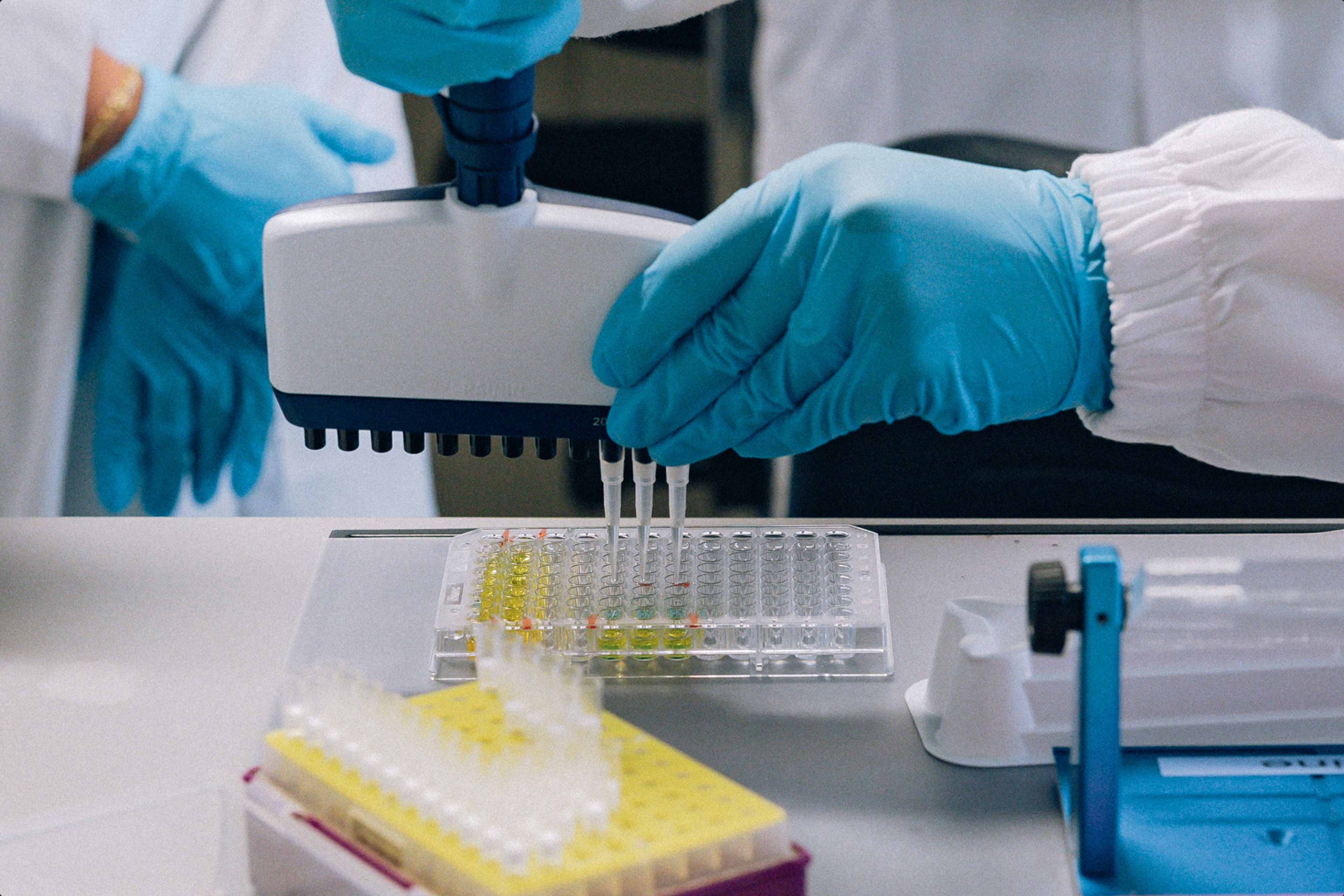
·
Nutrition·
Studies·
